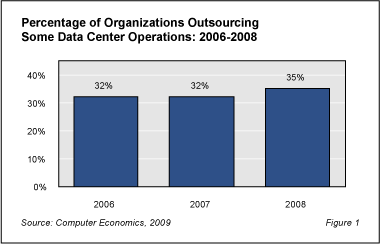The level of data center outsourcing has remained fairly constant over the past few years. But we believe interest in outsourcing data center operations, in whole or in part, will increase as the ailing economy enforces cost-containment initiatives and as capital expenditures are limited by the credit crunch. CIOs and IT managers need to be aware of new and evolving options for outsourcing and carefully investigate the pros and cons of providers and their service offerings.
Turning over responsibility for an organization’s data center operations to an outside party, generally known as outsourcing, has been an element of IT strategy for many years. In fact, IT started as an outsourced industry, back when most computing was done by way of “time sharingâ€â€”renting time (CPU cycles) on mainframes owned by third-party service providers.
This Research Byte is a summary of our full report, Time Right to Revisit Data Center Outsourcing Strategy.
Data Center Outsourcing Varies by Degree
First it is important to define what the term “outsourcing†encompasses. There are several approaches lumped under the data center outsourcing category, depending on which functions the service provider performs.
Outsourcing varies by degree. Co-location, for example, involves leasing space, power, bandwidth, and even manpower in an outside data center facility to run servers owned by the customer. Managed service providers (MSPs) will oversee parts or the whole of the customer’s IT infrastructure, reducing manpower requirements. Hosting providers will lease servers and services for any range of specific applications from e-mail to e-commerce activities.
Outsourcing varies in other ways. A data center service provider can take over the customer’s entire data center operation, or it can handle the customer’s IT processing requirements in data centers owned by the service provider. There are myriad regional service providers from mom-and-pop shops to well-established midsize firms, and there are global outsourcers with familiar names like Accenture, CSC, EDS, and IBM that offer soup-to-nuts data center outsourcing services.
In the full report, we use a broad definition of data center outsourcing, defining it as any service that enables an organization to significantly reduce the amount of internal resources devoted to managing servers, storage, and other data center equipment and facilities. In this study, we also examine the level of data center outsourcing as a percentage of data center work outsourced.
Data Center Outsourcing Steady in Past Three Years
For the past few years the percentage of companies outsourcing data center operations has remained fairly constant. As shown in Figure 1, about one-third of organizations turn over at least some data center operations to third parties.

The full version of this report presents data on the percentage of organizations outsourcing data center operations, the percentage of data center work outsourced, and the percentage of organizations increasing and decreasing data center outsourcing. We assess how satisfied organizations are with their outsourcing partners. We also examine outsourcing by sector and level of IT spending. We conclude with our recommendations for organizations considering outsourcing of data center operations as well as negotiating with service providers in light of current economic conditions.
This Research Byte is a brief overview of our report on this subject, Time Right to Revisit Data Center Outsourcing Strategy. The full report is available at no charge for Computer Economics clients, or it may be purchased by non-clients directly from our website at https://avasant.com/report/time-right-to-revisit-data-center-outsourcing-strategy-2009/ (click for pricing).
For a more comprehensive study on IT outsourcing, please refer to our report IT Outsourcing Trends: Outsourcing Statistics for 11 IT Functions.

